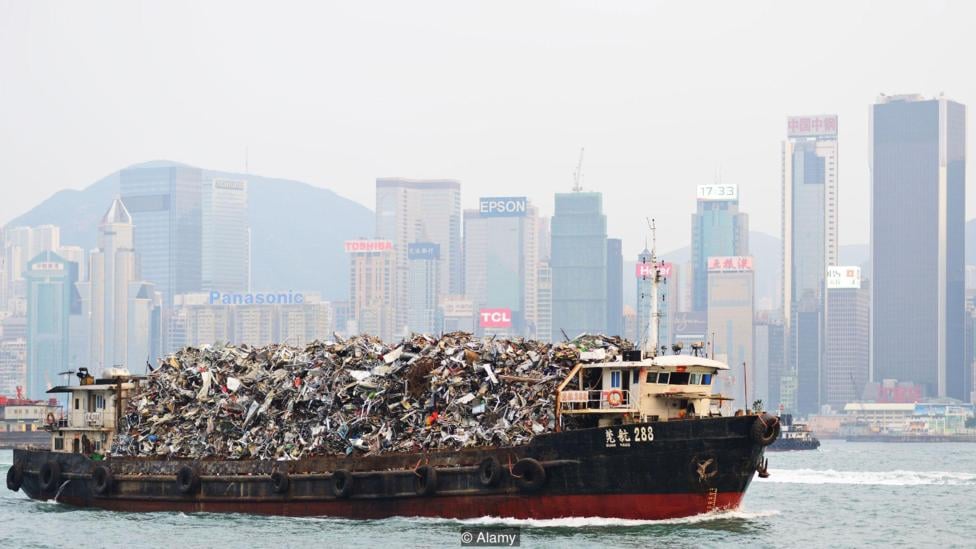* Terms and Conditions apply.
After reading this disturbing article “Hong Kong has a monumental waste problem” http://www.bbc.com/future/story/20170427-hong-kong-has-a-monumental-waste-problem it made me think about the problems of negative externalities of consumption and production (spillover costs to third parties not involved in the economic transaction) associated with the creation of rubbish and methods that Hong Kong can use to deal with them. The concept of negative externalities can be illustrated below. The shaded triangle illustrates the loss to society that occurs when things are either produced or consumed in amounts greater than the socially optimal level.
The growing rubbish problem being illustrated in the article is a result of both producers and consumers creating too much waste. So what are the possible solutions that Hong Kong should consider? Firstly I would like to address the recycling point. Back when I was doing my masters degree I was helping another student complete their dissertation on the recycling industry. Their findings were that recycling is a very bad use of the environmental dollar. What I mean by this is if the government has a fixed amount of money that can be spent improving the environment the opportunity cost of subsiding a recycling industry means that money cannot be spent on other things ie planting trees , cleaning up rivers etc. Recycling in itself in many instances is not necessarily very environmentally friendly either. Many plastics cannot be recycled, bleaches used to recycle paper are harmful to the environment, energy used to remelt glass for recycling is often greater than energy needed to make new glass, toxic components from recycled electric goods are often dumped and pollute water ways etc.
 Credit to Alamy
Credit to Alamy
However the single biggest problem with recycling can be highlighted in this article from Forbesmagazine “ At a certain point, though, recycling developed something of a dark side from an environmental perspective. On the surface, it’s still a good idea both to recycle waste and to design products and packaging with the idea of recycling them in a closed loop. Unfortunately, in its modern-day incarnation, recycling has also given the manufacturers of disposable items a way to essentially market overconsumption as environmentalism. Every year, reports come out touting rising recycling rates and neglecting to mention the soaring consumption that goes along with them. American consumers assuage any guilt they might feel about consuming mass quantities of unnecessary, disposable goods by dutifully tossing those items. into their recycling bins and hauling them out to the curb each week.” (https://www.forbes.com/sites/amywestervelt/2012/04/25/can-recycling-be-bad-for-the-environment/#9db178a3bec5)
A very good example of this is the Pacific Coffee initiative raised in the article. There would be so much less waste if coffee shops always asked people would they like a cup rather than just assume a disposable one unless specifically asked. Coffee shops install the additional cardboard to keep the drinks ‘hot or cold’ from touching a customer’s fingers whether they desire this protection, or not. At the same time telling customers it’s ok because that cardboard is made from recycled paper. I do not mean to seem like I am singling out coffee shops but this is an example of marketing being a bigger priority to the businesses than any real and serious attempt to reduce rubbish in Hong Kong.
The real issue for the environment and the amount of rubbish that is generated in Hong Kong is how to reduce the creation of the rubbish in the first place not just recycling the unnecessarily produced rubbish. For example in many countries ie Thailand it is often possible to bring your empty water bottle to a reverse osmosis machine and only pay to have your bottle refilled with clean, cold water. This is so much better than selling a new plastic bottle every time someone needs some more water. The reason that a business does not do this is because it is more profitable and easier simply to sell the bottled water.
If Hong Kong and its government really wish to deal with the amount of waste produced they need to seriously address how to produce less waste and not simply how to clean up the excess waste products that are produced. Thought needs to be given to education and legislation that actually make consumers and producers minimize their waste creation. Recycling, incinerating and landfill are not on their own the best solutions available for the country. These things need to be combined with attitude and behavior changes of the population in order to minimize the problem.